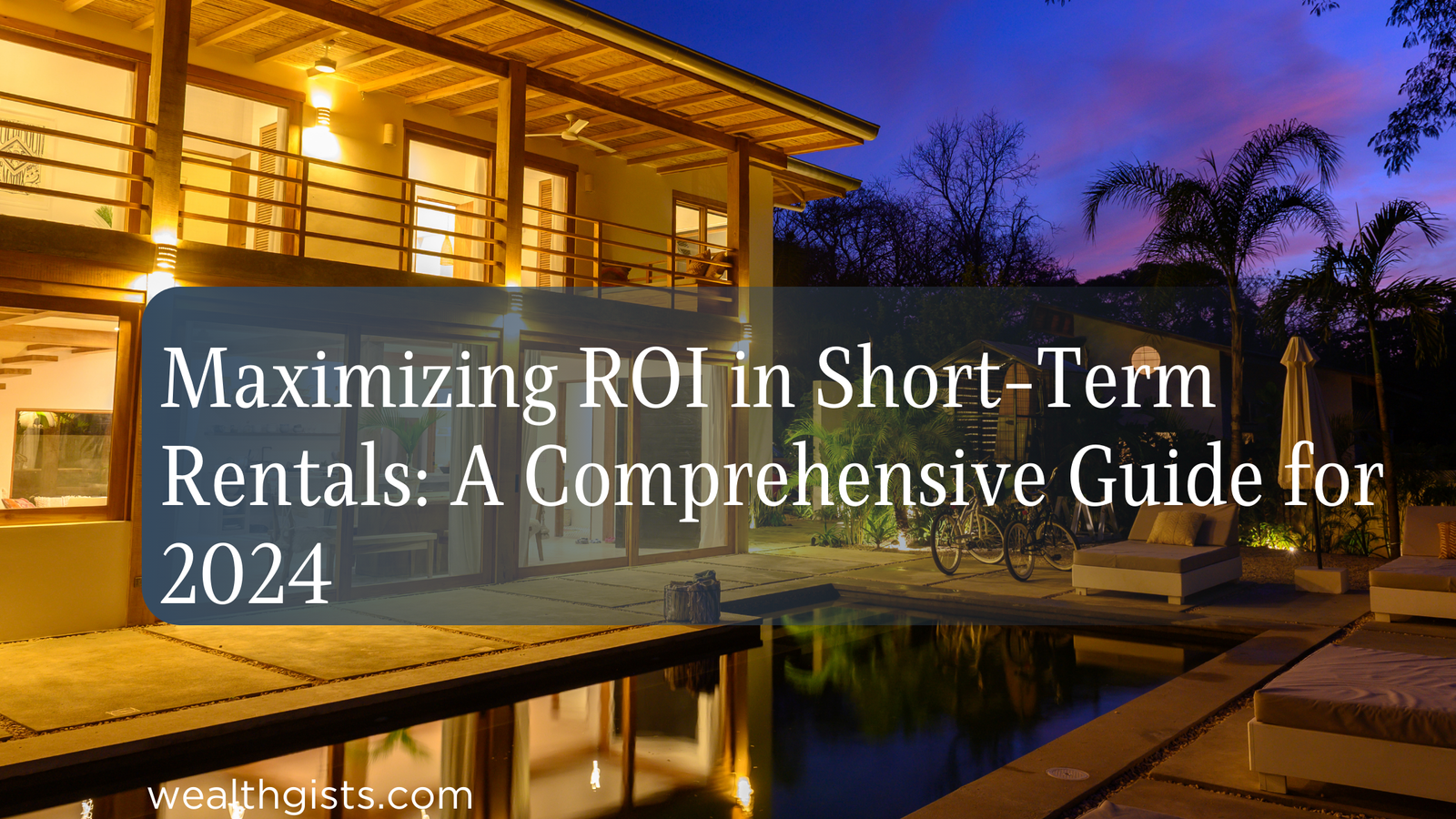The vacation rental market has experienced significant growth in recent years, driven by technological advancements and evolving consumer behavior. As we look ahead to 2024, this guide aims to provide a comprehensive checklist for maximizing ROI in the short-term rental market. By understanding key factors such as location, property types, operating expenses, revenue projections, legal aspects, marketing strategies, and exit strategies, you can navigate this competitive industry and achieve high returns on your investment.
The Locational Blueprint
In the vacation rental market, the adage “location, location, location” holds. Choosing the right location for your rental property is crucial to attracting guests and maximizing rental rates and occupancy.
Tourist Attractions
Proximity to major tourist destinations can significantly boost rental rates and occupancy. Consider properties near popular attractions, landmarks, or cultural sites that attract a consistent flow of tourists throughout the year. Analyze the demand for short-term rentals in these areas and evaluate the potential for high rental income.
Seasonality
Understanding the high and low seasons of a location is essential for developing a successful rental strategy. Some areas experience peak tourism during specific months, while others have a relatively consistent flow of visitors year-round. By aligning your pricing and marketing efforts with seasonal trends, you can optimize your revenue and occupancy rates.
Safety and Zoning
Before investing in a property, thoroughly investigate local laws, zoning regulations, and the overall safety of the area. Ensure that your property complies with all necessary permits and licenses for short-term rentals. Ignoring these regulations can lead to legal complications and financial penalties.
Property Types: What Fits Your Portfolio?
The type of property you choose directly impacts your ROI. Different property types have varying maintenance requirements, rental income potential, and target audiences. Consider the following options when selecting properties for your portfolio:
Beachfront Villas
Beachfront villas offer high ROI potential but require significant maintenance due to their exposure to coastal elements. These properties are ideal for attracting vacationers seeking a luxurious and tranquil getaway.
City Apartments
City apartments are typically smaller in size, requiring lower maintenance costs. However, they can be highly profitable in popular cities with consistent demand from business travelers, tourists, and short-term residents.
Mountain Cabins
Mountain cabins may have seasonal demand but can yield high ROI during peak times such as ski seasons or summer vacations. These properties appeal to outdoor enthusiasts seeking a cozy retreat in nature.
Initial Costs: Beyond the Price Tag
When considering a vacation rental investment, it’s important to account for additional costs beyond the property’s purchase price. These costs include renovation and furnishing expenses, legal fees and licenses, and other initial expenses.
Renovation and Furnishing
Enhancing the appeal and comfort of your rental property is essential for attracting guests and receiving positive reviews. Budget for renovation and furnishing expenses to create an inviting space that meets the expectations of your target market.
Legal Fees and Licenses
Navigating the legal aspects of short-term rentals requires expert guidance. Budget for legal fees, including consultation with an attorney experienced in vacation rental regulations. Additionally, ensure that you obtain all necessary licenses and permits required by local authorities.
Operating Expenses: The Ongoing Costs
Running a successful vacation rental property involves ongoing expenses that should be carefully managed to maximize your ROI. Consider the following factors when estimating your operating expenses:
Utility Bills and Maintenance
Utility bills for vacation rentals are often higher than those for residential properties due to increased guest turnover. Additionally, regular maintenance is necessary to keep the property in good condition and address any issues promptly. Budget for these expenses to ensure a seamless guest experience.
Property Management
Decide whether you will manage the property yourself or hire professionals for property management. While self-management can save costs, it requires significant time and effort. Property management companies can handle guest communication, bookings, maintenance, and other operational tasks, allowing you to focus on maximizing your profits.
Revenue Projections: Forecasting Profits
To optimize your ROI, it’s crucial to forecast your potential rental income accurately. Advanced tools and analytics can help you make data-driven decisions and predict your revenue. Consider the following strategies:
Data Analytics
Utilize platforms and tools that provide comprehensive data and insights about the vacation rental market. Analyze market trends, average daily rates, and occupancy rates to determine the optimal pricing and marketing strategies for your property.
Dynamic Pricing
Adjust your pricing dynamically based on factors such as seasonality, local events, and even weather forecasts. Dynamic pricing allows you to maximize your revenue by capitalizing on high-demand periods and adjusting rates during slower periods.
Legal Aspects: Navigating Regulations
Compliance with local regulations is crucial for the long-term success of your vacation rental business. Failure to adhere to zoning laws and tax regulations can result in fines, legal complications, and reputational damage. Take the following steps to navigate the legal aspects effectively:
Zoning Laws
Ensure that your property is zoned for short-term rentals. Familiarize yourself with the specific regulations and restrictions imposed by local authorities. It’s advisable to consult with an attorney or seek advice from local vacation rental associations to stay up to date with any changes in regulations.
Tax Implications
Short-term rentals often have specific tax guidelines that differ from long-term rentals. Research the tax obligations for vacation rentals in your jurisdiction and consult with a tax professional to ensure compliance. Deductible expenses, such as service fees, cleaning supplies, and marketing costs, can help reduce your tax liability.
Marketing: Beyond Listing Platforms
In a crowded vacation rental market, effective marketing is crucial to attract guests and maximize your occupancy rates. Consider the following strategies to enhance your marketing efforts:
Social Media Engagement
Leverage social media platforms to showcase your property and engage with potential guests. Share high-quality photos, videos, and enticing descriptions to create a compelling online presence. Collaborate with local influencers and travel bloggers to increase your property’s visibility.
SEO Optimization
Optimize your vacation rental website and online listings using search engine optimization (SEO) techniques. Research relevant keywords, create informative content, and optimize your website’s structure to improve its organic visibility on search engines like Google.
Reviews and Ratings
Positive reviews and ratings are essential for building credibility and attracting new guests. Encourage guests to leave reviews by offering incentives such as discounts on future stays. Respond promptly and professionally to negative reviews, addressing any concerns and demonstrating your commitment to guest satisfaction.
Exit Strategy: Planning the Unthinkable
While planning for a successful short-term rental business, it’s essential to consider an exit strategy. Market conditions, personal circumstances, or changing investment goals may warrant a change in your approach. Explore the following options:
Sale
Monitor market conditions and consider selling the property if it aligns with your financial goals. Timing the sale strategically can maximize your ROI and allow you to reinvest in other ventures.
Long-term Rental
Transitioning your property into a long-term rental can provide stability and consistent income. While long-term rentals may offer lower returns compared to short-term rentals, they involve fewer operational responsibilities and may be suitable for passive income generation.
Conclusion
Investing in short-term rentals in 2024 requires careful planning, thorough research, and constant adaptation to market trends. By considering factors such as location, property types, operating expenses, revenue projections, legal compliance, marketing strategies, and exit strategies, you can maximize your ROI in this competitive industry. Remember to stay informed about local regulations, leverage technology and automation, and prioritize guest satisfaction. With a strategic approach and attention to detail, you can unlock the full potential of your short-term rental investment.





